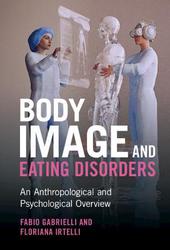
|
Body Image and Eating Disorders: An Anthropological and Psychological Overview
Hardback
Main Details
| Title |
Body Image and Eating Disorders: An Anthropological and Psychological Overview
|
| Authors and Contributors |
By (author) Fabio Gabrielli
|
|
By (author) Floriana Irtelli
|
| Physical Properties |
| Format:Hardback | | Pages:200 | | Dimensions(mm): Height 235,Width 156 |
|
| Category/Genre | Coping with eating disorders |
|---|
| ISBN/Barcode |
9781316514306
|
| Classifications | Dewey:306.4613 |
|---|
| Audience | | Tertiary Education (US: College) | |
|---|
| Illustrations |
Worked examples or Exercises; Worked examples or Exercises
|
|
Publishing Details |
| Publisher |
Cambridge University Press
|
| Imprint |
Cambridge University Press
|
| Publication Date |
9 June 2022 |
| Publication Country |
United Kingdom
|
Description
One of the paradoxes of our current era is that only 10% of obese or overweight people are actually dieting, whereas nearly 20% of the remaining population are trying to lose weight, even if they do not need to. This volume looks into our contemporary relationship with food by inserting current body image and eating disorders, like orthorexia and bigorexia, into a broader, historical overview. Gabrielli and Irtelli combine their knowledge of psychoanalysis and anthropology with scientific research and clinical experience to create this truly interdisciplinary work. Their study uses psychoanalytical theories about our 'hyper-modern' times to trace the impact that mass media has on individuals, families and societies. It explores various 'food tribes' and exposes the contradictions of today's mass media that advertise fitness and dieting alongside increasingly tastier and accessible foods. The work helps us to understand our highly social relationship with our bodies and what we eat.
Author Biography
Dr. Fabio Gabrielli is a clinical practitioner and Professor of Philosophical Anthropology and Biochemistry at Ludes University of Lugano, Switzerland where he has previously served as Dean. Gabrielli has published over two hundred works including papers on 'Quantum Human and Animal Consciousness' (2011) and 'Considerations on Blood Platelets: A Neuron's Mirror for Mood Disorders?' (2012). Floriana Irtelli is a lecturer at the Catholic University of the Sacred Heart, Milan. She is a psychoanalyst and psychotherapist. Irtelli also works at the Fatebenefratelli Hospital, Milan, performing research and clinical activities. She has edited collections on Psychosis (2018) and Family Therapy (2019). Her most recent book is about Contemporary Perspectives on Relational Wellness (2018).
Reviews'In this ambitious volume, the authors situate eating and body image disorders as pathologies reflecting the crisis of humanity in an increasingly mechanized world. Sweeping through existential and deconstructionist philosophy, anthropology and cultural studies, psychoanalysis and neuroscience, this book offers a unique integration, to be savored across disciplines and time.' Sarah Schoen, The William Alanson White Institute, USA The hypermodernity of the liquid society roots its distorted dynamics only in the external experience of existence. The body therefore plays a central role in social communication: the body as exteriority, the body as mediator of life and psychic suffering, the body as the only element on which to build society ... seduction itself no longer passes through the refined play of the intellect and sentiment but only through the extreme, deified exteriority at the same time dereified by modern communication technologies, timeless because it is linked to the terror of passing time. The authors analyze with mastery and from a mixed philosophical and psychological perspective (but isn't it true that psychology has one of its roots in philosophy?) the development from the traditional society to a liquid and hypermodern one of the conceptualization and the role of the body in psychological development (covering the individual, social, and political facets). In this they use not only metaphors and literature data, but constant references to everyday reality, re-read and framed in an epistemology that is not only useful but necessary to provide adequate tools to interpret the current course of humanity. Federico Durbano, State University, Milan, Italy Floriana Irtelli and Fabio Gabrielli in Contemporary Perspectives on Body Image, Eating Disorders and Body Image Disorders develop theoretical and clinical ideas by revisiting classical references, in the light of new scientific and sociological perspectives. They start from an analysis of the social and cultural context in which the man of the 21st century lives and focus on a cogent aspect of contemporary fragility eating disorders and body image disorders. The authors face the suffering of today's man with particular disenchantment and lucidity, aware that suffering is an opportunity to promote growth processes. Maria Pia Roggero, SIPRe, Societa Italiana di Psicoanalisi della relazione, Italy
|